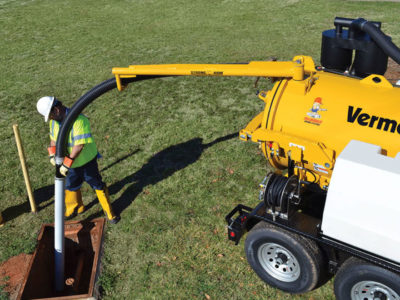Want to get the most from your vacuum excavator every day? Then you’d better spend a few minutes with your crew discussing routine maintenance. Luckily, vacuum excavators don’t require a lot of effort. Your team just needs to establish a good daily routine they can stick to.
The maintenance items crew members should perform throughout the work day will take as little as 15 minutes.
- Check fluid levels: Checking fluid levels regularly is a good habit to establish and can help you identify potential issues before they become major problems. Frequent or significant fluid loss can be an indication of mechanical issues or leaks, so be sure your team is keeping track of how much and how often they’re adding fluid. Here are the fluids that should be checked each morning.
- Engine oil
- Engine coolant
- Hydraulic oil
- Blower oil
- Water pump oil
- Pay attention to your vacuum gauge: To ensure you’re getting the very best suction performance throughout the day, operators should pay attention to their vacuum levels. High levels when not under load could be an indication of a dirty filter, hose malfunction or full spoil tank.
- Clean the air filter regularly: At the end of each day, your crew should take a moment to check the condition of the vacuum excavator’s air filter. Dirty filters should be washed out and given enough time to dry before being reinserted. It’s also a good idea to keep an extra filter on hand so they can be rotated in challenging environments or applications.
- Clean hoses and tank: After you’ve worked your vac all day, it’s always a good idea to spray out the hose and clean the tank before leaving for the day or shutting down for the weekend. Dry, caked-on material can reduce the suction power of your system.
- Avoid using high-pressure water tools on the hose because that could damage it.
- The onboard tank washout is a great tool to prevent material from caking on. However, you should periodically check the seals around the tank to ensure they’re in good shape.
- You should also remove dirt and mud from the vac’s water/air tools daily and unplug any clogged nozzles.
- Grease: Your vac system has several grease points that should be tended to regularly. Check your operator’s manual for a complete list. It is always a good idea to grease at the end of the day when the bearings are warm and more accepting of grease.
- Make sure your vac is road ready: Whether you’re pulling a vac trailer or driving a truck, make sure all of your tires are properly inflated and all of the lights are working.
- Perform manufacturer-recommended preventative maintenance: Your vacuum excavator’s operator’s manual outlines preventative maintenance service intervals. Being diligent about recommended service intervals can help you maximize the life of your machine.
Keep an eye on outside temperatures
When outdoor temperatures begin to cool off in the fall, your crew will also need to make sure they have taken the proper steps to prevent water from freezing inside the pumps and hoses. Winterizing your machine involves adding and circulating antifreeze throughout your hydro-vac’s water system. You can review model-specific information in your operator’s manual.
Keep in mind, winterizing your vacuum excavator should be done anytime the overnight temperatures are close to freezing. Pay particular attention to overnight lows in the fall and spring since daytime highs and lows can vary greatly.
For more information about vacuum excavator routine maintenance, contact your local Vermeer dealer or visit Vermeer.com.
© 2019 Vermeer Corporation. All Rights Reserved.
